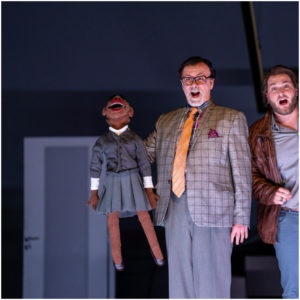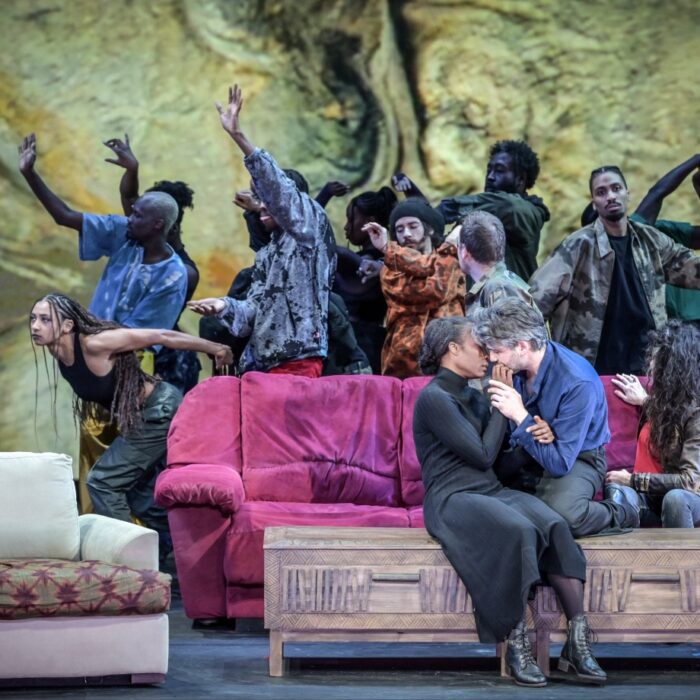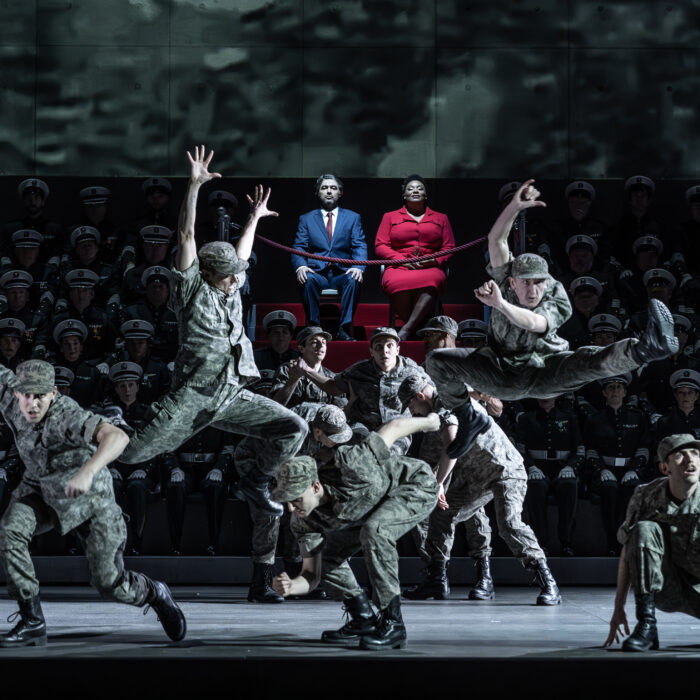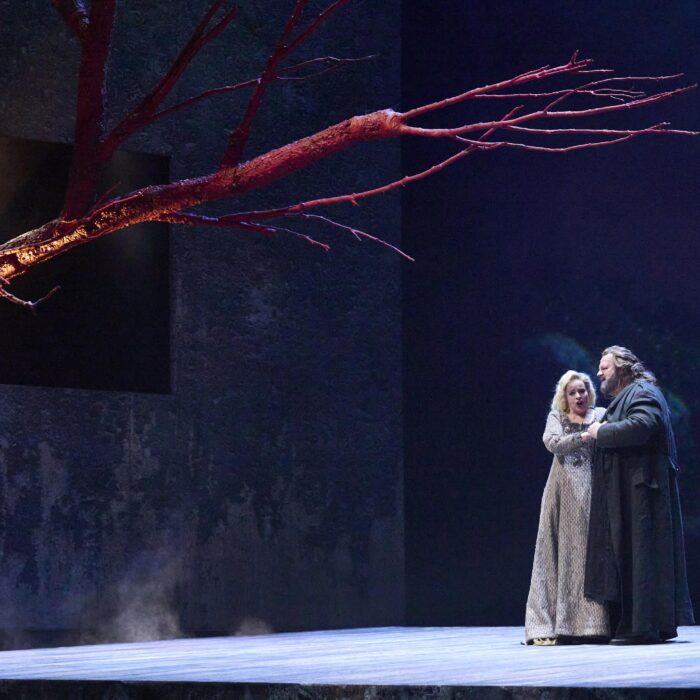
Royal Opera House 2021-22 Review: Don Pasquale
Michieletto’s Biting Production Finds Pathos in Comedy
By Benjamin Poore(Credit: © 2022 ROH. Bill Cooper)
Damiano Michieletto’s new production of Gaetano Donizetti’s “Don Pasquale” first hit the Royal Opera House stage in 2019, and now finds itself revived by Daniel Dooner. It’s a taut and challenging production of a work whose petty cruelties and incipient viciousness tend to be smoothed out by caricature, slapstick, and the desire to give the audience a jolly good time. Michieletto’s contemporary vision is much bleaker and takes the work more seriously – whether this is a good thing or not will depend on how far an audience is willing to be pushed, and what kind of evening they have in mind. Donizetti’s tale of old age, disguise, and deception involves lots of bel canto tosh – fake notaries, fake nuns, fake feelings – but isn’t necessarily a light-hearted one at all.
A Chilly Vision
Paolo Fantin’s sets are skeletal – the freestanding doors frequently seemed to be more of a help than a hindrance – and the shroud of darkness surrounding them rather ominous, the first scene illuminated with hard strip-lighting. The aesthetic of the first half is grotty, petty bourgeois domestic gloom; the second gleams with the emptiness of wealth without class. The wide open space works against the relatively slender voices onstage. It’s a very chilly vision of an opera most often presented as a comedy, but in doing so Michieletto gives Donizetti’s subtitle of dramma buffo proper underlining.
The garden in which the final scene unfolds is no such thing – it is the return of the (garish) green screen on which an establishing photoshoot happens, a space of pretense and humiliation. In the very final moments of the opera, it is where Pasquale ends up, forced into a wheelchair and humiliated by his housekeeper, all captured on film and projected huge onto the backdrop. It is one of the more convincing uses of video projection in an opera production, perhaps because of the disconcerting effect of seeing faces so up close and in such detail, which adds to the alienating character of the production’s spectacle.
There are other (cynical) experiments with performance and control, not least in the vivid puppetry that returns several times to illuminate sequences and humiliate Pasquale (as well as enliven Donzietti’s rather prosaic placeholder choruses.)
The overall impression of a substanceless and empty world, a reflection of both Pasquale’s inner emptiness and the ruthless cynicism of Malatesta and Norina; the latter’s motivation, established in a dumb show in her first scene, comes from the way she is overlooked and put upon by the models whose photoshoots she waits on. An opportunity to play dress up and get back at the vain and the powerful is too good to resist. Her excesses are best represented in the cold modern furniture with which she kits out Pasquale’s pad, and a brand new Maserati – ‘and now a message from our sponsors’, one wonders – which has a frigid gleam on the stage.
The audience found themselves laughing – much to my surprise – at the cruelties not despite them, not least at the shattering moment in Act three where Pasquale is slapped by Norina and has his self-respect revealed as the ultimate fraud in the opera. Pasquale’s rage and impotence are given a psychoanalytic gloss in some moments of striking tenderness, where Alessandro Carletti’s lighting softens to a nostalgic umber glow and sees him as a boy and his mother appear as if in flashback. The suggestion is of arrested development or the tragedy of being unable to find another relationship like the most primal one. It is a smart intervention into the action that generates some well-deserved pathos.
It’s not a regular evening of comedy, but Michieletto’s production explores much more interesting territory than that, giving the feeling of investigating the work and its strange sadism. The relationship of Norina and Malatesta would welcome some more development, though the hint at the end seems to be that Ernesto is simply their next mark. The nasty little moral at the end is exposed for what it is in this disconcerting vision of the piece. It is an absorbing and engaging evening out, if not exactly a comfortable one, and probably all the better for it.
A Solid Cast
Lucio Gallo takes the title role, and delivers it with an impressive range of textures and timbres, matching Michieletto’s rounded conception of the character. His moment of breakdown in Act three after the slap – ‘E’ finita, Don Pasquale’ – had a faltering, glassy fragility that captured the emotional and psychological implications of the scene. His patter was somewhat thwarted by the unfriendly stage design, at least for a voice of this size, and led to rhythmic infelicities and ensemble wobbles in his great number with Malatesta, but these may even out over the course of the show.
Pretty Yende’s ROH debut was in Donizetti in “L’elisir d’amore” in 2017, where she impressed. Coloratura sparkled throughout and dovetailed with characterization and mood. However, the Act three duet with Ernesto was soft-grained and well-shaped, as was Yende’s opening aria, which required considerable musical and physical dexterity to navigate the smartly choreographed stage business. Yende clearly relished the sharp-elbowed characterization.
Her partner-in-crime was Andrzej Filończyk’s Malatesta, who is not much of a doctor in this show, but performed with vocal and dramatic swagger. It’s a smaller voice but wiry and lean, yet also was clearly capable of spinning long bel canto lines which never felt hard-edged.
Xabier Anduaga’s Ernesto isn’t given much to do by Donizetti – Don Ottavio syndrome strikes again – but navigated his arias with real elan and warmth, like Filończyk showing off excellent phrasing and a warm sense of line that made a compelling contrast with the raw cynicism of Norina and Malatesta. His petulance and frustration with the stuffy, tyrannical Pasquale at the outset was well done.
Giacomo Sagripanti kept the orchestra on a tight leash, not least in a buzzing overture that wanted a little more textural contrast between its various episodes, though the music-making settled over the course of the show. A couple of blemishes did not detract from a honeyed trumpet solo, and gently amplified guitar playing from Forbes Henderson and Nigel Woodhouse made for a mellow interlude in Act three.


